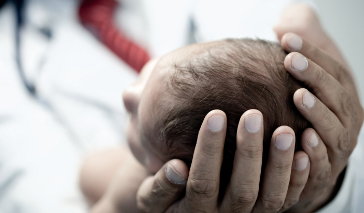In infant boys, undescended testes (chryptorchidism) occurs when the testicles fail to drop from the abdomen down into the scrotum before birth. In 80 percent of cases, the undescended testicles will spontaneously drop into place on their own so initial treatment usually consists of watching and waiting.
If the testicles do not descend on their own, they can be treated with either hormones or surgery. If surgery is needed, it should be done by nine to 15 months of age, at the latest, to avoid future complications such as:
Hormone Treatment of Undescended Testicles
While a male fetus is still in the womb, hormones such as testosterone send a signal to the testicles to move from the abdomen—where they develop—to the scrotum. After birth, if the testicles have not descended, hormones (such as hCG or LH-releasing hormone) can be injected into one of the infant's muscles, often the buttocks. The method is typically used for those babies whose testicles are already near the scrotum, or when blood tests reveal that the undescended testes are the result of underlying hormonal conditions.
Researchers think hormone therapy works because it encourages the testicles to make testosterone, which signals their descent. The shots are given either daily or weekly, typically over a course of 5 weeks. Success rates vary and the approach has several risks, including:
- Skin discoloration
- Early pubic hair growth
- Increased penis size
- Erections in boys before puberty
Surgery for Undescended Testes
Surgery for an undescended testicle (orchiopexy) requires a surgeon to make an incision in the groin, then manually move the testicle into the scrotum. This procedure is successful in most (up to 98 percent) infant patients.
The surgery can also be done through a cut along the edge of the scrotum. This method is faster, produces less discomfort, and is safer. Other times doctors use a technique called laparoscopy, in which a small cut is made below the belly button. Since this method is less-invasive, infants tend to heal faster.
At many hospitals, laparoscopy is used when the testicles are located in the abdomen. The choice of surgery, however, depends upon the age of the patient, the size and location of the testicle, and the surgeon's skills with the procedures.
Main complications of surgery include:
- Testicle shrinkage
- Injury to the vas deferens, the tube that carries sperm to the ejaculate
- The testicle reascending into the abdomen
- Inflammation of the testicle or the epididymis (the tube where sperm mature)
- Fluid in the scrotum (hydrocele)
Infants can usually go home the day of the surgery. For fastest recovery, the incision should be kept dry for 48 hours. For one to two weeks, parents should try to prevent infants from playing games that involve straddling toys or participating in strenuous activities. Pain medications may be prescribed in the first 48 hours, if needed.
A follow-up visit will be scheduled a few weeks after the procedure to ensure the baby is healing well, and another one year later to make sure the testicle has remained in the scrotum and is developing normally.
Prognosis Following Treatment for Undescended Testes
Fewer than 20 out of 100 infant males have complete testicle descent with hormone therapy alone. If the testicle initially rested in a high position (either the abdomen or within the muscles of the abdominal wall), approximately 15 out of 100 boys who have been treated with hormones will have a recurrence. Although surgery typically produces a good outcome in 80 to 92 percent of cases, success still relies on the testicle's position at the time of the procedure.
References
Elder JS. (2011). Disorders and anomalies of the scrotal contents. Nelson Textbook of Pediatrics, 19th ed.
Hesse V, Fischer G. (1988). Three injections of human chorionic gonadotropin are as effective as ten injections in the treatment of cryptorchidism. Horm Res. 30(4-5):193-7.


